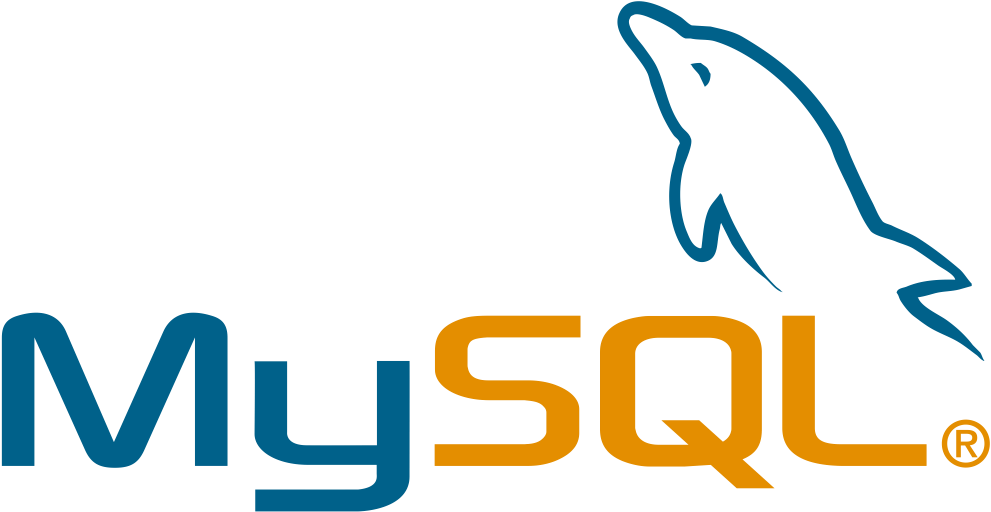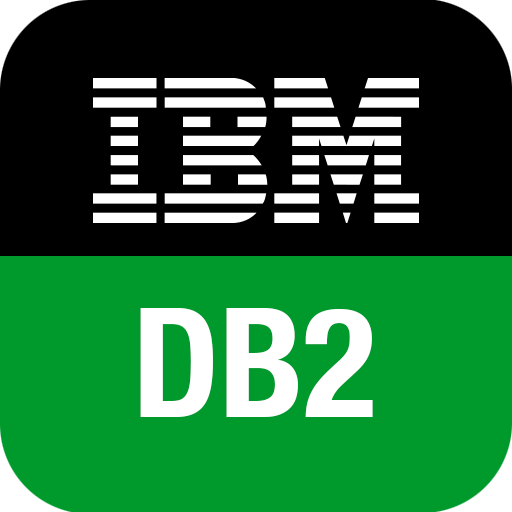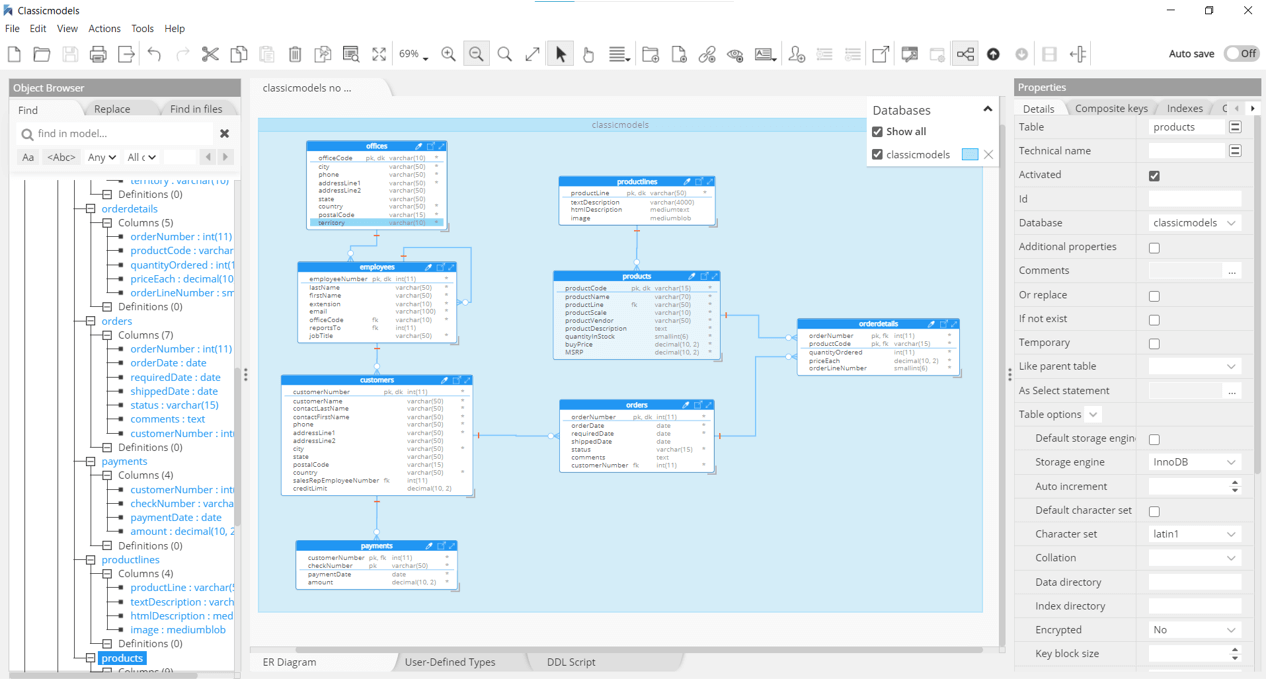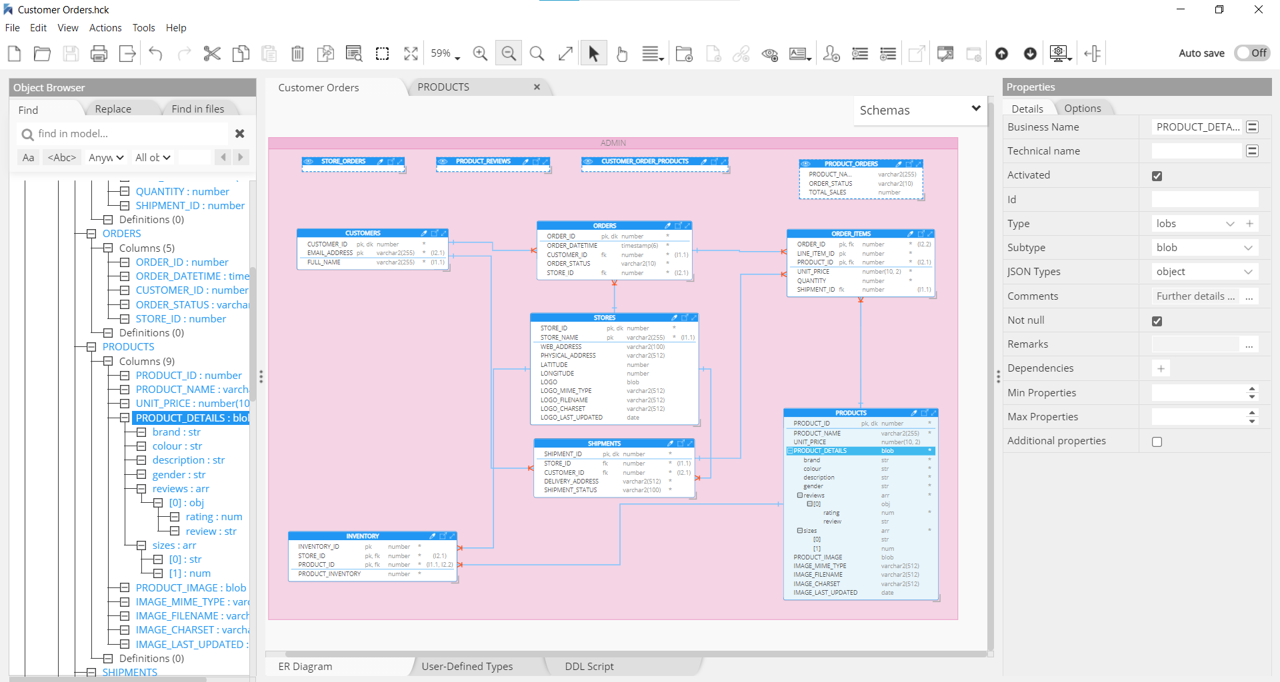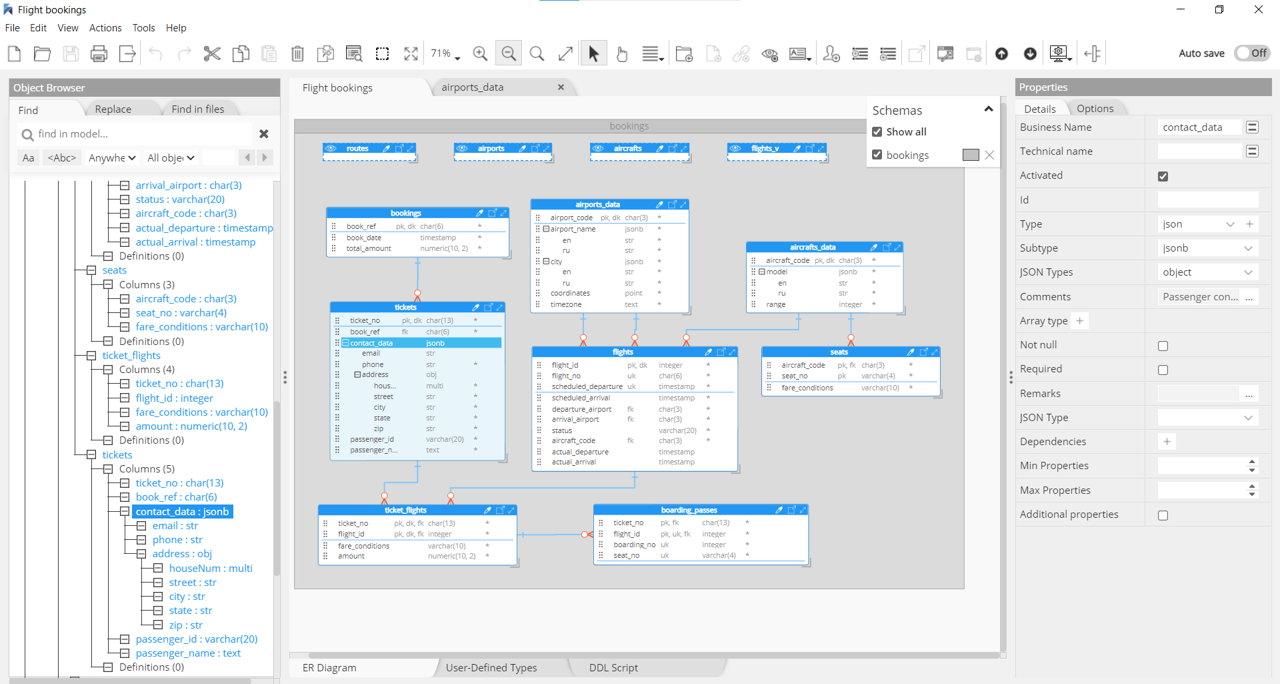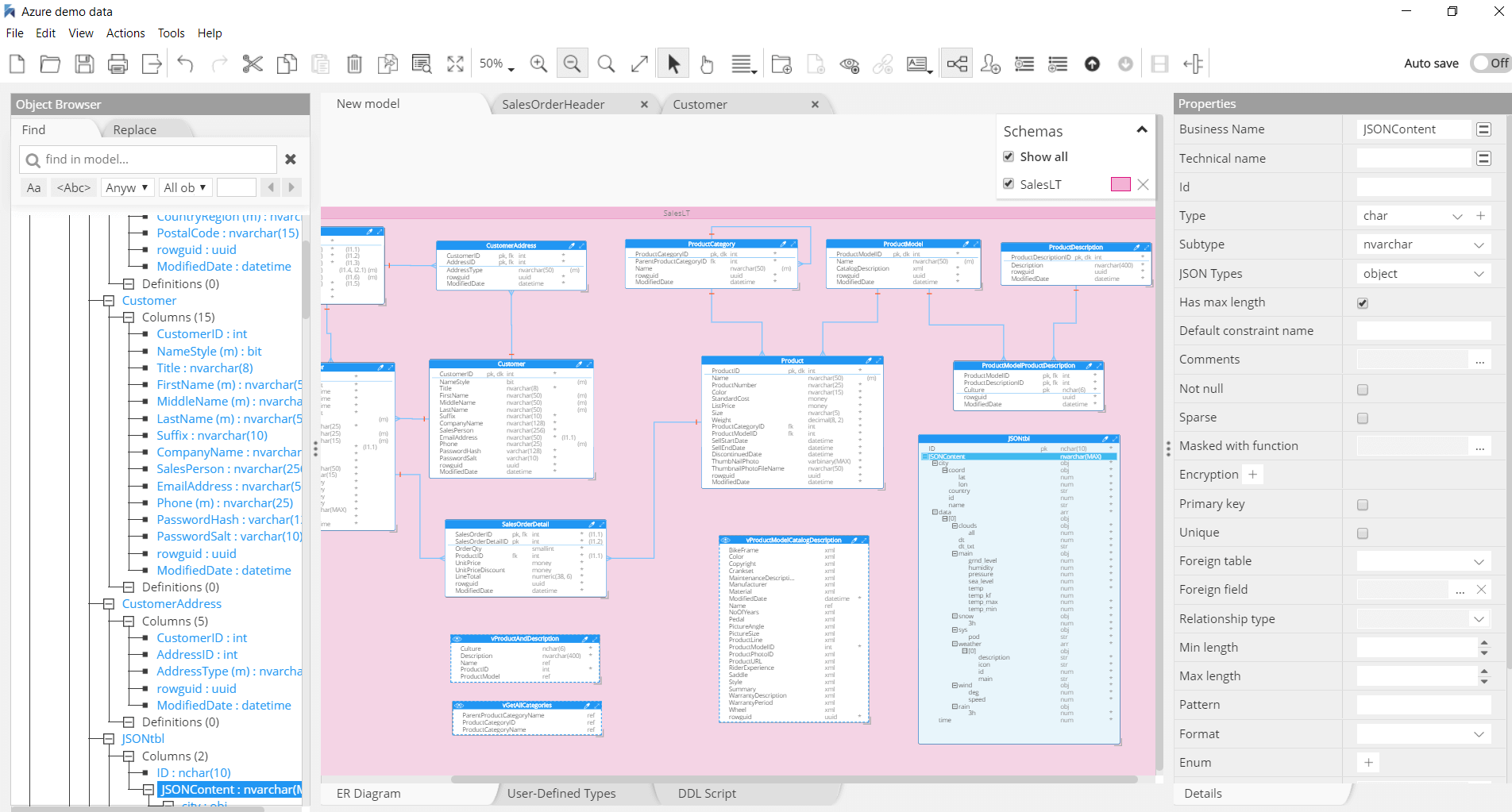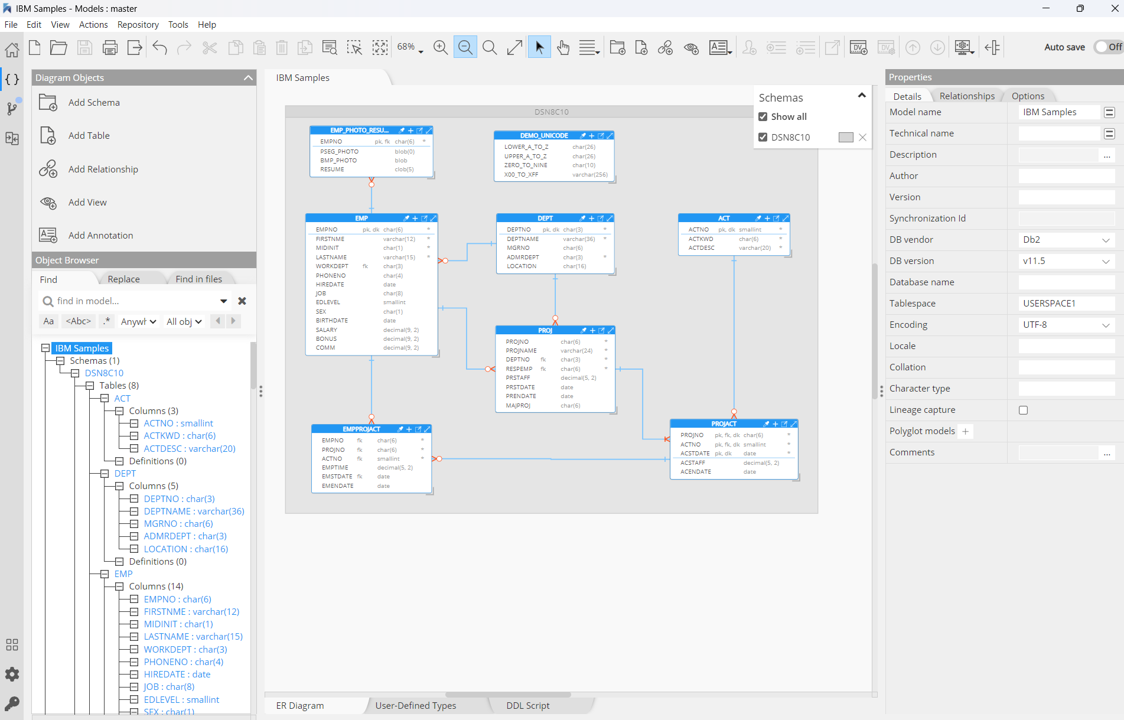Relational Databases
Autonomous
EnterpriseDB
Azure SQL
MariaDB
MariaDB is a community-developed, commercially supported fork of the MySQL relational database management system, intended to remain free and open-source software.
Hackolade has the unique ability to model complex semi-structured objects stored in columns of the longtext data type. The reverse-engineering function, if it detects JSON documents, will sample records and infer the schema to supplement the DDL table definitions.
Hackolade was specially adapted to support the data modeling of MariaDB, including databases, tables and views, indexes and constraints, plus the generation of DDL Create Table syntax.
MySQL
MySQL is one of the most widely used relational database management system (RDBMS) on the market. MySQL is free and open-source software under the terms of the GNU General Public License, and is also commercially supported.
Hackolade has the unique ability to model complex semi-structured objects stored in columns of the LONGTEXT data type. The reverse-engineering function, if it detects JSON documents, will sample records and infer the schema to supplement the DDL table definitions.
Hackolade was specially adapted to support the data modeling of MySQL, including databases, tables and views, indexes and constraints, plus the generation of DDL Create Table syntax.
Oracle and Autonomous
Oracle is a multi-model database management system commonly used for running online transaction processing (OLTP), data warehousing (DW) and mixed (OLTP & DW) database workloads. It may be run by several service providers on-premises, on-cloud, or as hybrid cloud installation, as well as on Oracle hardware.
Hackolade has the unique ability to model complex semi-structured objects stored in columns of long text data type. The reverse-engineering function, if it detects JSON documents in BLOB and JSON columns, will sample records and infer the schema to supplement the DDL table definitions.
Hackolade was specially adapted to support the data modeling of Oracle, including schemas, tables and views, indexes and constraints, plus the generation of DDL Create Table syntax.
PostgreSQL and EnterpriseDB
PostgreSQL, also known as Postgres, is a free and open-source relational database management system (RDBMS) emphasizing extensibility and SQL compliance. It has earned a strong reputation for reliability, feature robustness, and performance.
Hackolade has the unique ability to model complex semi-structured objects stored in columns of long text data type. The reverse-engineering function, if it detects JSON documents in JSON or JSONB columns, will sample records and infer the schema to supplement the DDL table definitions.
Hackolade was specially adapted to support the data modeling of PostgreSQL, including schemas, tables and views, indexes and constraints, plus the generation of DDL Create Table syntax.
Microsoft SQL Server
and Azure SQL Database
SQL is aimed at different audiences and for workloads ranging from small single-machine applications to large Internet-facing applications with many concurrent users
Hackolade has the unique ability to model complex semi-structured objects stored in columns of the (N)VARCHAR(MAX) data type. The reverse-engineering function, if it detects JSON documents, will sample records and infer the schema to supplement the DDL table definitions.
Hackolade was specially adapted to support the data modeling of SQL Server and Azure SQL Database, including schemas, tables and views, indexes and constraints, plus the generation of DDL Create Table syntax.
IBM Db2 and Db2 on Cloud
IBM Db2 is a relational database that delivers advanced data management and analytics capabilities for transactional workloads. This operational database is designed to deliver high performance, actionable insights, data availability and reliability, and it is supported across Linux, Unix and Windows operating systems.
Hackolade Studio was specially adapted to support the data modeling of Db2, including schemas, tables and views, indexes and constraints, plus the generation of DDL Create Table syntax. In particular, Hackolade Studio has the unique ability to model complex semi-structured JSON objects stored in text columns. The reverse-engineering function, if it detects JSON documents, will sample records and infer the schema to supplement the DDL table definitions.
Hackolade currently has no intention to support connectivity to a mainframe, as we would have no test platform, except through the reverse-engineering of DDLs. We currently only support integration of Db2 for LUW.
CockroachDB
CockroachDB is a commercial distributed SQL database management system developed by Cockroach Labs. It is built on a transactional and strongly-consistent key-value store. It scales horizontally; survives disk, machine, rack, and even datacenter failures with minimal latency disruption and no manual intervention; supports strongly-consistent ACID transactions; and provides a familiar SQL API for structuring, manipulating, and querying data.
CockroachDB is compatible with version 3.0 of the PostgreSQL wire protocol (pgwire) and the majority of PostgreSQL syntax.
Hackolade has the unique ability to model complex semi-structured objects stored in columns of long text data type. The reverse-engineering function, if it detects JSON documents in JSON or JSONB columns, will sample records and infer the schema to supplement the DDL table definitions.
Hackolade was specially adapted to support the data modeling of CockroachSB, including schemas, tables and views, indexes and constraints, plus the generation of DDL Create Table syntax.
YugabyteDB with YSQL API
YugabyteDB is a distributed, hybrid and multi-cloud open source community-driven database. It combines relational database capabilities with the horizontal scalability and resilience of cloud native architectures. YugabyteDB is like PostgreSQL re-imagined for a cloud native world.
Hackolade has the unique ability to model complex semi-structured objects stored in columns of long text data type. The reverse-engineering function, if it detects JSON documents in JSON or JSONB columns, will sample records and infer the schema to supplement the DDL table definitions.
Hackolade was specially adapted to support the data modeling of Yugabyte, including schemas, tables and views, indexes and constraints, plus the generation of DDL Create Table syntax.
Note: Hackolade currently supports only the YSQL Postgres API, i.e. does NOT support the YCQL Cassandra API.

